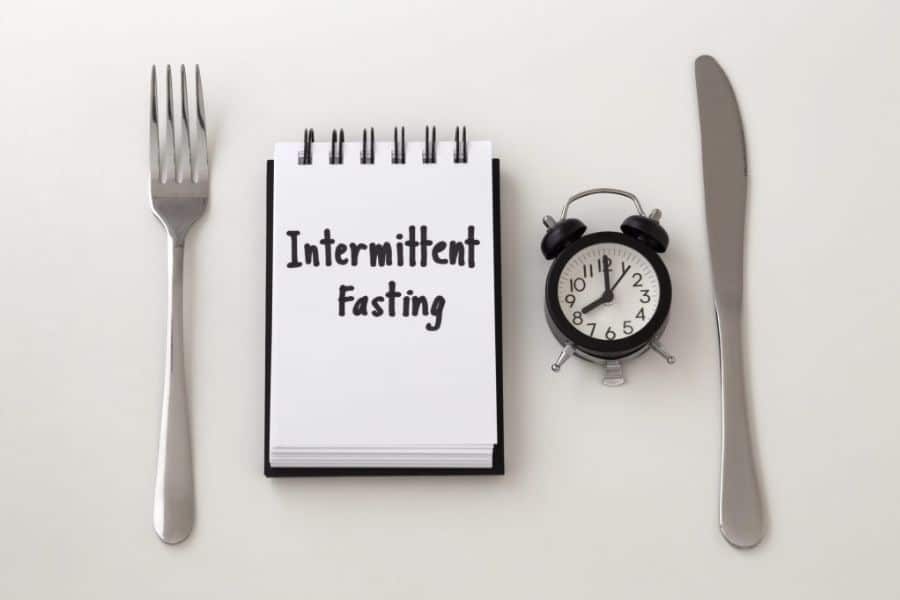Understanding Intermittent Fasting
Intermittent fasting is like a new eating rhythm that flips between chow time and hold time. Think about it as setting alarms for when you munch instead of what you munch. Many folks jump on board because it’s supposed to pack a punch with weight loss and overall well-being.
Benefits of Intermittent Fasting
Intermittent fasting has become quite the sensation, and not just ’cause everyone’s doing it. There’s science backing up the perks. Let’s break ’em down:
- Weight Loss: Why do folks love it? Shedding those extra pounds! Fasting nudges your body into burning calories more efficiently and turns your metabolism up a notch.
- Better Insulin Sensitivity: Say hello to a better handle on blood sugar, which in turn reduces the type 2 diabetes risk (Healthline).
- Heart Health: It might give your heart a boost by lowering blood pressure and bad cholesterol levels, making heart disease take a backseat.
- Tackles Inflammation: Fasting might just punch chronic disease-causing inflammation in the gut.
- Brain Boost: Buzz is, fasting may rev up brainpower by keeping oxidative stress and blood sugar in check (Johns Hopkins Medicine).
- Live Longer: Some critter studies suggest fasting’s a secret to a longer life. Curious? Look deeper into these perks in our article on intermittent fasting benefits.
Side Effects of Intermittent Fasting
Like mom always said, nothing comes without a hitch. Intermittent fasting ain’t all rainbows; here’s the lowdown:
-
Hungry with a Capital H: Skipping meals might crank up hunger. According to a 2018 study with 112 people, hunger stalked those doing intermittent diets more than continuous calorie choppers (Healthline).
-
Headaches ‘n Dizzy Times: The starting days can bring headaches as your body wonders what’s what (Harvard Health Publishing).
-
Feeling Lazy: You might find yourself lacking zip, lounging more than usual while getting in the groove of fasting.
-
Grumpiness Alert: As your body asks “Where’s my food?” expect your mood to sometimes go south.
-
Tummy Troubles: Constipation and bloats can tag along initially, so glugging a lot of water might help.
| Side Effect | What’s Going On? |
|---|---|
| Hungry with a Capital H | Feeling of hunger hits harder when fasting |
| Headaches ‘n Dizzy Times | Brain fog as the body gets comfy with a new idea |
| Feeling Lazy | Sluggishness as you cut down on bites |
| Grumpiness Alert | Mood swings make a cameo, especially while adjusting |
| Tummy Troubles | Initial fun with constipation and bloating; drinking water might help |
Always good sense to check with your doc before shaking up your diet, especially with health quirks in the mix. For some beginner tips, peep our intermittent fasting for beginners guide. Pondering on working out on an empty stomach? We’ve got that covered in our intermittent fasting and exercise article.
For pointers on health specifics and potential dangers, spin over to our bit on intermittent fasting and autophagy.
Impact on Weight Loss
So, you’re ready to lose those pesky pounds? Let’s chat about intermittent fasting, a method that’s gaining quite a buzz for its weight-loss potential. We’ll dive into how this approach actually works and back it up with some good ol’ scientific proof that shows just how effective it is.
Weight Loss Mechanism
Intermittent fasting? It’s not just about dodging meals; it’s all about timing your eating to set off some cool body processes. When you go 12 to 14 hours without munching, your body starts using stored fat for energy. This releases ketones to fuel you up. Switching from burning carbs to fat — that’s where the magic happens for weight loss.
How It Works:
- Eat Less, Weigh Less: Limited eating hours means fewer calories sneaking in, helping you with that calorie deficit — a must for weight loss.
- Burn Baby Burn: Long fasting stints make your body dig into its fat stash for energy, ramping up fat burning.
- Better Insulin Game: Fasting tunes up your body’s insulin reaction, making fat burning a tad easier.
Need a plan? Check out our intermittent fasting schedule for the inside scoop.
Studies and Findings
Research shows that intermittent fasting really can help shed pounds. One review of 27 trials found that this fasting routine led to weight loss between 0.8% and 13% of starting body weight. Turns out, it’s a pretty handy tool for managing weight.
Key Findings:
- Steady Shedding: Across the board, those trying intermittent fasting dropped the pounds. One study noted that folks doing the 16/8 schedule (16-hour fast, 8-hour munch window) saw real results.
- Bye-Bye Fat: The pounds lost mostly came from fat, not muscle, which is great news for your metabolism.
- Slimmer Waists: More than 4 weeks in, participants not only lost weight but also trimmed down their waistlines, cutting that tricky visceral fat that’s linked to better health (NCBI).
| Study Duration | Weight Loss (%) | Waist Reduction (inches) |
|---|---|---|
| 4 Weeks | 0.8 – 2.0 | 1 – 1.5 |
| 8 Weeks | 2.0 – 5.0 | 1.5 – 2 |
| 12 Weeks | 5.0 – 8.0 | 2 – 3 |
| 24 Weeks | 8.0 – 13.0 | 2.5 – 3.5 |
Curious about more perks of fasting? Swing by our intermittent fasting benefits section to find out more.
The proof’s in the pudding — intermittent fasting can seriously zap fat. Ready to jump in? Check out our intermittent fasting for beginners page to kick off your journey.
Different Approaches to Intermittent Fasting
When it comes to shedding those extra pounds, intermittent fasting offers a handful of tricks. Pick your flavor—there’s something for everyone!
16/8 Method
The 16/8 Method is like the reigning champ in the fasting world. Clock in 16 hours of no-nibbling and keep your eats all snug in an 8-hour window. Say you wrap up dinner by 8 PM; your next meal won’t make an appearance till noon the following day.
| Time of Day | Activity |
|---|---|
| 8:00 PM | Last meal |
| 8:00 AM – 12:00 PM | Fasting period |
| 12:00 PM – 8:00 PM | Eating window |
Skipping breakfast might just become your new best friend. It’s a cinch to sneak this method into your daily routine, and it can turbocharge weight loss while keeping your body’s engine—your metabolism—running smoothly. It even keeps those pesky insulin levels in check. Want to dig deeper? Check out regulating insulin levels.
5:2 Fasting
With 5:2 Fasting, you spend five days a week eating like you always do. The other two days? You’ll pull back the reins to around 500-600 calories. You decide which days, so it won’t cramp your style.
| Day of the Week | Fasting Status |
|---|---|
| Monday | Regular eating |
| Tuesday | Fasting (500-600 calories) |
| Wednesday | Regular eating |
| Thursday | Regular eating |
| Friday | Fasting (500-600 calories) |
| Saturday | Regular eating |
| Sunday | Regular eating |
Balance is key here—live life normally most days, and dabble in fasting when it fits your lifestyle. This method might just be your ticket to losing weight and boosting your metabolic game. Check out the fancy science behind it right here.
Alternate-Day Fasting
The Alternate-Day Fasting (ADF) method is a straightforward deal; fast one day, feast the next. On fasting days, you cut back or keep it under 500 calories. Normal munching resumes the day after.
| Day | Fasting Status |
|---|---|
| Day 1 | Fasting (≤500 calories) |
| Day 2 | Regular eating |
| Day 3 | Fasting (≤500 calories) |
| Day 4 | Regular eating |
| Day 5 | Fasting (≤500 calories) |
This approach can pack a punch, slashing pounds and trimming waistlines. Though it’s not the easiest first step for everyone, it’s a strong contender for balancing insulin and keeping glucose levels in check. Get the stats here.
Finding the right fasting plan is like slipping into a pair of cozy shoes—comfort is key. For newbie tips and tricks on starting this journey, check out more on intermittent fasting for beginners and snag some meal planning tips to hit the ground running.
Considerations and Risks
Thinking about jumping into intermittent fasting? Before you dive headfirst into hunger hours, let’s chat about the stuff you really need to know. It can be a great way to say goodbye to those pesky pounds, just don’t forget it’s not all sunshine and rainbows.
Health Considerations
You want to get healthy, not just hangry, right? Well, it’s been said fasting can keep your waistline in check and keep some nasty illnesses at bay too, like obesity and type 2 diabetes (check out Johns Hopkins Medicine).
But everyone’s different, so the fasting game plays out differently for you compared to your neighbor.
-
Fatigue and Low Energy: Some folks feel like their energy got up and left for vacation because their blood sugar drops, making them tired or messing up their sleep (thanks, Healthline).
-
Irritability: There’s the grumpy monster that comes out when you haven’t eaten. A 2016 study pointed out that people on an 18-hour fast were noticeably cranky.
| Health Factor | Impact |
|---|---|
| Weight Management | Thumbs Up |
| Disease Prevention and Reversal | Thumbs Up |
| Fatigue and Low Energy | Thumbs Down |
| Irritability | Thumbs Down |
Risks and Cautions
It’s not all plain sailing though. Let’s chat risks so you don’t end up in the fasting danger zone.
-
Overeating: After going without grub, your body might want to play catch up so bad it overcompensates when you do eat again, forming bad eating habits (Harvard Health Publishing spills the beans).
-
Nutrient Deficiencies: Skipping meals isn’t just skipping calories; it’s skipping those vital vitamins and minerals too. Planning is your best friend here.
-
Potential Psychological Effects: Obsessing over meal times can really mess with your head, making food more of a frenemy that causes anxiety.
| Risk Factor | Description |
|---|---|
| Overeating | The urge to binge after fasting |
| Nutrient Deficiencies | Happens when meal planning goes MIA |
| Psychological Effects | When food becomes the enemy |
Want to sidestep these landmines? Take it slow and maybe holler at a pro for advice. Ease into it, nibble on a diet that’s got the good stuff, and peep our piece on intermittent fasting for beginners for an easy start.
Absorb these tidbits, tackle fasting safely, and blend it into your routine like a champ. Whether you’re after slim results or just the know-how, get nosy with our bits on intermittent fasting benefits and see what intermittent fasting results look like for winning at the fasting game.
Effectiveness and Long-Term Outcomes
Wondering if skipping meals every now and then actually helps you shed those pounds? Let’s chat about what makes intermittent fasting tick and what it means for the long haul.
Weight Management Results
Think of intermittent fasting as the new kid on the block in weight loss. Studies are saying it’s got some cred. One investigation over at NCBI reported people dropped anywhere from a little under 1% up to 13% of their body weight. That’s a mix of folks—944 souls stretching across 27 trials. Oh, and about their waistlines? They shrank by a tidy 3 to 8 cm, but only if they stuck to the plan for more than a month.
Speaking of other trials, Harvard T.H. Chan School of Public Health found a drop of 7-11 pounds on average. Study sizes were kinda all over the place, from a handful to a couple hundred participants, with folks checking in from a couple of weeks to two years.
Here’s a quick look at who lost what:
| Study | Participants | How Long (weeks) | Pounds Lost (avg) | Waist Shrink (cm) |
|---|---|---|---|---|
| NCBI Review | 944 | 4+ | Varies: 0.8% to 13.0% BW | 3 – 8 |
| Harvard Review (40 studies) | Varies: 4 to 334 | 2 to 104 | 7 – 11 | N/A |
Long-Term Studies and Observations
So, what’s the deal when it comes to keeping it off? Comparing fasting with just cutting calories shows the scale can tip similarly. Both camps shed between 4.6% and 13% (NCBI).
Again, Harvard steps in to remind us that while these results are cool, we’re still waiting on those gold-star studies with longer follow-ups to tell us the definite knows.
Here’s a quick peek at long-term findings:
| Study Type | Takeaway | Time Watching |
|---|---|---|
| Regular Diet vs. Intermittent Fasting | Similar loss: 4.6% to 13% | 2 to 104 weeks |
| Harvard’s Two Cents | Need more serious, lengthy studies | Year-plus advised |
No matter how you slice your meals, pairing fasting with a smart intermittent fasting meal plan and getting advice from a pro helps make sure you’re on the right track. You’ll likely see more upside and less downside that way.
Craving more details? Check out our pieces on intermittent fasting results and intermittent fasting weight loss for more juicy insights.
Practical Guidelines and Recommendations
Starting a gig like intermittent fasting for shedding some pounds? It’s not just about skipping meals; there are tricks of the trade to keep it safe and sound.
Implementation Tips
Ready to give fasting a go? Here’s how to dive in without giving your stomach too much shock:
-
Choose Your Style: Pick something that doesn’t turn your daily routine upside down. Many folks dig the 16/8 method where you stop chewing for 16 hours and feast for 8. Or, hop on the 5:2 fasting train—eat like usual for five days and then get stingy with the grub the other two.
-
Plan Your Plate: Make those eating hours count. Go for whole foods, protein that doesn’t moo too much, veggies, and good fats. Steer clear of packaged junk and the sweet stuff.
-
H2O is Your BFF: Pour yourself some water before and after you eat. Herbal tea and black coffee also get the green light when you’re counting the hours.
-
Check In with Yourself: Notice how you’re feeling throughout. Strange stuff like jitters, head throbs, or feeling queasy? Give a health pro a ring.
-
Sweat it Out: Mix fasting with workouts to speed up fat burn and boost your vibes. Take a peek at our intermittent fasting and exercise tips to learn more.
-
Hang In There: Stick to your fasting style to score results. Your body might take a hot minute to get on board, so hang in there.
Professional Advice and Consultation
Before you jump all in, it’s wise to have a heart-to-heart with a healthcare whiz, especially if there’s any health stuff lurking. Some might want to skip fasting altogether, as going long on a fast like 24 or 48 hours can go sideways fast.
A professional can set you up with a fasting game plan that suits you down to a tee, making sure you’re in the clear for any nasty side effects. While common troubles like dizziness or headaches usually don’t go off the charts during fasting, it’s a smart move to keep tabs on how you’re holding up.
For more tips on getting started and what to expect, swing by our intermittent fasting for beginners post. Need some munching inspiration during those eating windows? Our intermittent fasting meal plan is just a click away.
Stick to these tips and chat with a pro, and you’ll be on track with your fasting plan to hit those weight loss and health targets while keeping your health in check.










